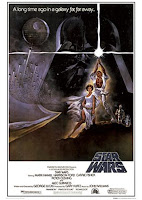
Writer/Director: George Lucas
Year: 1977
Cinematographer: Gilbert Taylor
Its been many years since the last time I saw this classic, and I'm not as impressed by the filmmaking as I was when I was younger. However, the sound design really blew me away, and I appreciated how the script flowed, although Lucas' later CGI inserts slow it down and distract from the story. I found myself surprised by how funny the story is, with great comic relief coming from C3P0 and R2D2 especially. I don't remember seeing that comedy in the newer episodes 1-3. I enjoyed the special effects, because they are so far from being realistic I was actually left to enjoy the story as a movie experience, I really must emphasize how much I prefer the in camera affects (like of the space ships flying over head being shots of models) over the CGI animation affects of today. Its a fun movie, I wonder if there is a DVD version out there without the newly added CGI animals and stuff, oh, and the Jabba the Hut scene that was added, I really found the CGI animation distracting there.
Still, it was good fun and I am now pumped about rediscovering The Empire Strikes Back and Return of the Jedi with Ingrid, who has never seen any of the films and was asking me after the movie ended if Princess Leia would end up with Luke or Han Solo. Its cool to experience it with someone who is seeing it with totally fresh eyes and hasn't had the surprises ruined... she apparently doesn't know about "Luke, I am your father!"
The characters really do draw you in, and when you imagine seeing Darth Vader for the first time, he's a really impacting villain, obviously he's totally unforgettable, but I had a nice experience with the ubiquitous movie because I hadn't visited it's fantasy world in so long. I totally got sucked up all over again by the wonder of space travel.
 Writer/Directors: Andy and Lana Wachowski
Writer/Directors: Andy and Lana Wachowski Director: Martin Campbell
Director: Martin Campbell





















